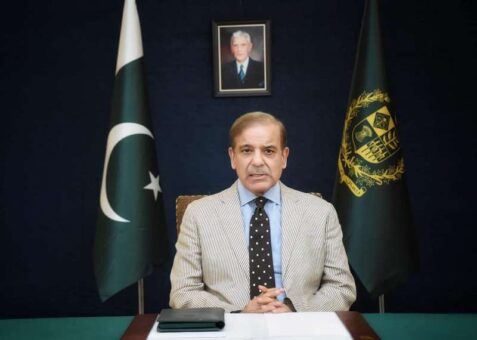Islamabad, May 8, 2024 – Aimed at addressing the educational crisis, Prime Minister Shehbaz Sharif announced an “Education Emergency” across Pakistan.
This initiative seeks to tackle the formidable challenge of enrolling approximately 26 million out-of-school children and advancing the nation towards becoming one of the most educated societies globally.
During the National Conference on Education Emergency, Prime Minister Sharif expressed his firm resolve to rectify the country’s educational deficiencies, stating, “Today, with iron conviction, and the support of provinces, we will handle the challenge of 26 million out-of-school children. We will bring them back to school… I declare from this moment an Emergency in Education all over Pakistan…The way we did it in Punjab, we will do it in Pakistan.”
The Prime Minister emphasized his personal commitment to the initiative, revealing plans to work closely with all chief ministers, irrespective of political differences, to ensure a cohesive and unified approach towards education reform. He passionately reminded the attendees, which included federal ministers, parliamentarians, vice-chancellors, diplomats, and development partners, that the project was about the future of Pakistan’s children.
Reflecting on historical precedents set by nations like Germany and Japan, which transformed their societies post-adversity, Sharif was optimistic about Pakistan’s potential to emulate such successes through concerted educational efforts.
Highlighting past achievements during his tenure as Punjab’s Chief Minister, Sharif cited significant improvements in enrollment rates, particularly among girls, through the Zevar Taleem Programme, and initiatives that rescued children from labor in brick kilns to enroll them in schools. He also mentioned the outsourcing of poorly performing schools and the establishment of Daanish Schools and the Punjab Education Endowment Fund, which provided scholarships to deserving students.
Addressing the conference, Minister for Federal Education and Professional Training, Dr. Khalid Maqbool Siddiqui, described the dire state of education in Pakistan as “disturbing, alarming and disheartening,” underscoring the urgent need for action.
International voices also weighed in on the discussion. Unicef Representative in Pakistan, Abdullah A. Fadil, pointed out that over 70% of ten-year-olds in Pakistan could neither read nor understand simple text. British High Commissioner Jane Marriott emphasized the demographic potential of Pakistan, which has 60% of its population under the age of 30, and stressed the importance of making decisive choices for the future.
The World Food Programme’s Country Director, Coco Ushiyama, linked food security with education, advocating for school meals as a crucial investment in the country’s future. Additionally, World Bank Vice President Martin Raiser highlighted the issue of stunted growth among Pakistani children and the necessity of investing in climate resilience for the educational system.
The conference concluded with a message from Pakistan’s renowned mountaineer, Naila Kiani, who from Makalu Mountain, championed education as a vital foundation for fulfilling dreams, particularly urging more resources for girls’ education.
This sweeping declaration of an education emergency by Prime Minister Sharif marks a pivotal moment in Pakistan’s path towards educational reform and societal advancement.
